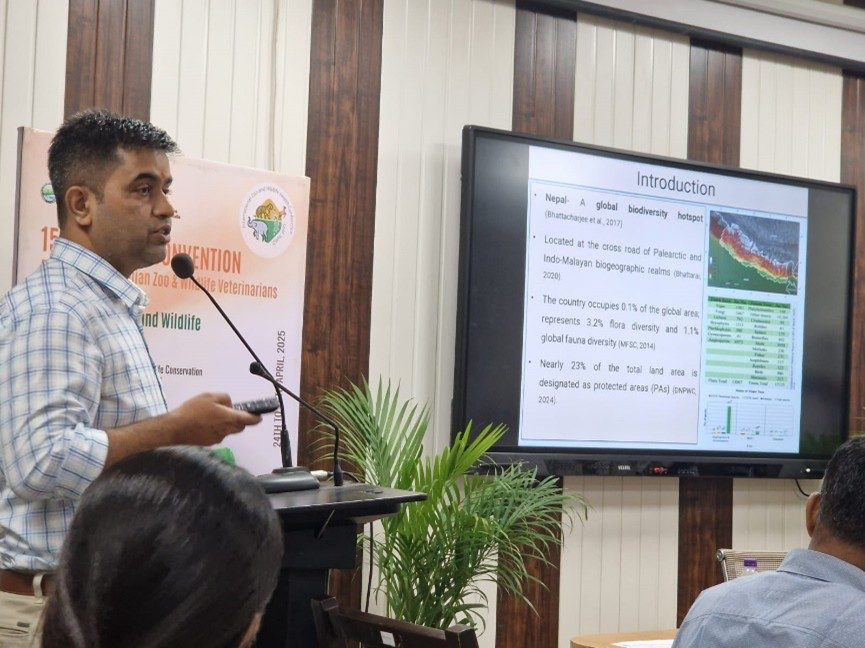International Zoo and Wildlife Health Conference in Jabalpur, India
09/06/2025
At the end of April, four intrepid wildlife vets set off from Nepal to India to attend the 15th Annual Convention of the Association of Indian Zoo and Wildlife Veterinarians and the associated International Zoo and Wildlife Health Conference.
WVI was delighted to be a Silver Sponsor for this event, which this year was focused on “Balancing Human Needs and Wildlife Conservation through Integrated Health Management”.
The fabulous four included long-standing WVI Veterinary Partner Dr Jess Bodgener, Assistant Professor and pathologist Dr Bikash Puri from the Agricultural and Forestry University and wildlife veterinarians Dr Dibya Paudel and Dr Pradeepa Silwal from Nepal’s National Trust for Nature Conservation.
This was the first time the Nepali delegates had had the chance to attend a large international conference like this. The wildlife vet community in Nepal is friendly but small, with less than 20 vets working full time with wildlife. By contrast, there were over 200 delegates at the conference, so it was a fantastic opportunity to connect with peers to share knowledge and experience.
Thanks to the generous donations of our supporters, WVI was also able to sponsor Dr Bikash and Dr Dibya’s attendance, while Dr Pradeepa was sponsored by the Cornell K. Lisa Yang Center for Wildlife Health.
After gathering in Kathmandu, the group flew to Delhi before taking an overnight train to Jabalpur, where they met up with Dr Carmen Smith, the Cornell K. Lisa Yang Center for Wildlife Health’s Free-Ranging Wildlife Pathology Fellow.
Travelling by train for the last leg saved some pennies, and some carbon.. and turned out to be really good fun!
.jpg)
As events got under way, the Nepali delegates weren’t just there to listen. Each of them had prepared and submitted an abstract in advance. We were delighted that all three abstracts were accepted and selected for oral presentations. This was a massive achievement as it was a busy schedule and there was stiff competition.
Dr. Puri, an associate professor at the Agricultural and Forestry University (AFU) in Rampur, Chitwan, presented on the recent developments in the veterinary pathology department at AFU and how this is contributing to disease investigations in wildlife. Bikash is starting a PhD that will adopt a One Health approach to investigate mortality in wild and domestic birds, with a particular focus on vultures. His long term aim is to help strengthen the diagnostic and disease surveillance capacity of the wildlife health sector in Nepal.

Following his presentation, Bikash told us:
“This was my first experience presenting in an international forum; in the beginning I had some fear, some hesitation, but I have to say I was lucky – the very supportive environment and engaging discussion helped me overcome these hesitations and now I have to say I am more confident, more motivated and would like to get more engaged in this type of scientific conference in the future.”
Up next, Dr. Paudel told us,
“𝐴𝑡𝑡𝑒𝑛𝑑𝑖𝑛𝑔 𝑡ℎ𝑒 𝑐𝑜𝑛𝑓𝑒𝑟𝑒𝑛𝑐𝑒 𝑤𝑎𝑠 𝑎 𝑡𝑟𝑢𝑙𝑦 𝑒𝑛𝑟𝑖𝑐ℎ𝑖𝑛𝑔 𝑒𝑥𝑝𝑒𝑟𝑖𝑒𝑛𝑐𝑒 𝑓𝑜𝑟 𝑚𝑒; 𝑖𝑡 𝑝𝑟𝑜𝑣𝑖𝑑𝑒𝑑 𝑎 𝑣𝑎𝑙𝑢𝑎𝑏𝑙𝑒 𝑝𝑙𝑎𝑡𝑓𝑜𝑟𝑚 𝑡𝑜 𝑔𝑎𝑖𝑛 𝑘𝑛𝑜𝑤𝑙𝑒𝑑𝑔𝑒 𝑓𝑟𝑜𝑚 𝑒𝑥𝑝𝑒𝑟𝑡𝑠 𝑤𝑜𝑟𝑘𝑖𝑛𝑔 𝑎𝑐𝑡𝑖𝑣𝑒𝑙𝑦 𝑖𝑛 𝑡ℎ𝑒 𝑓𝑖𝑒𝑙𝑑 𝑜𝑓 𝑤𝑖𝑙𝑑𝑙𝑖𝑓𝑒 ℎ𝑒𝑎𝑙𝑡ℎ 𝑎𝑛𝑑 𝑐𝑜𝑛𝑠𝑒𝑟𝑣𝑎𝑡𝑖𝑜𝑛. 𝐼𝑡 𝑤𝑎𝑠 𝑎 𝑤𝑜𝑛𝑑𝑒𝑟𝑓𝑢𝑙 𝑜𝑝𝑝𝑜𝑟𝑡𝑢𝑛𝑖𝑡𝑦 𝑡𝑜 𝑐𝑜𝑛𝑛𝑒𝑐𝑡 𝑤𝑖𝑡ℎ 𝑝𝑟𝑜𝑓𝑒𝑠𝑠𝑖𝑜𝑛𝑎𝑙𝑠 𝑎𝑛𝑑 𝑟𝑒𝑠𝑒𝑎𝑟𝑐ℎ𝑒𝑟𝑠 𝑓𝑟𝑜𝑚 𝑑𝑖𝑣𝑒𝑟𝑠𝑒 𝑏𝑎𝑐𝑘𝑔𝑟𝑜𝑢𝑛𝑑𝑠. 𝑃𝑟𝑒𝑠𝑒𝑛𝑡𝑖𝑛𝑔 𝑏𝑜𝑜𝑠𝑡𝑒𝑑 𝑚𝑦 𝑐𝑜𝑛𝑓𝑖𝑑𝑒𝑛𝑐𝑒 𝑖𝑛 𝑝𝑢𝑏𝑙𝑖𝑐 𝑠𝑝𝑒𝑎𝑘𝑖𝑛𝑔 𝑎𝑛𝑑 𝑠𝑐𝑖𝑒𝑛𝑡𝑖𝑓𝑖𝑐 𝑐𝑜𝑚𝑚𝑢𝑛𝑖𝑐𝑎𝑡𝑖𝑜𝑛, 𝑤ℎ𝑖𝑐ℎ 𝐼 𝑏𝑒𝑙𝑖𝑒𝑣𝑒 𝑤𝑖𝑙𝑙 𝑐𝑜𝑛𝑡𝑟𝑖𝑏𝑢𝑡𝑒 𝑡𝑜 𝑚𝑦 𝑝𝑟𝑜𝑓𝑒𝑠𝑠𝑖𝑜𝑛𝑎𝑙 𝑎𝑛𝑑 𝑝𝑒𝑟𝑠𝑜𝑛𝑎𝑙 𝑔𝑟𝑜𝑤𝑡ℎ. 𝑂𝑣𝑒𝑟𝑎𝑙𝑙, 𝑖𝑡 𝑤𝑎𝑠 𝑎 ℎ𝑖𝑔ℎ𝑙𝑦 𝑚𝑒𝑚𝑜𝑟𝑎𝑏𝑙𝑒 𝑒𝑥𝑝𝑒𝑟𝑖𝑒𝑛𝑐𝑒, 𝑤ℎ𝑖𝑐ℎ ℎ𝑎𝑠 𝑖𝑛𝑠𝑝𝑖𝑟𝑒𝑑 𝑚𝑒 𝑓𝑢𝑟𝑡ℎ𝑒𝑟 𝑖𝑛 𝑚𝑦 𝑤𝑜𝑟𝑘 𝑎𝑛𝑑 𝑠𝑡𝑢𝑑𝑖𝑒𝑠.”
Dr. Paudel, who is a wildlife veterinarian at NTNC Central Zoo in Kathmandu, presented her review of recent post-mortem findings among wild felids examined at the zoo, including three tigers and three leopards. Dibya is currently undertaking an MSc in pathology and will build on this study for her Master’s thesis.

Third to present was Dr Silwal, who told us afterwards:
“𝐴𝑡𝑡𝑒𝑛𝑑𝑖𝑛𝑔 𝑡ℎ𝑖𝑠 𝑐𝑜𝑛𝑓𝑒𝑟𝑒𝑛𝑐𝑒 ℎ𝑒𝑙𝑝𝑒𝑑 𝑚𝑒 𝑎 𝑙𝑜𝑡 𝑖𝑛 𝑑𝑖𝑓𝑓𝑒𝑟𝑒𝑛𝑡 𝑤𝑎𝑦𝑠…𝑖𝑡 𝑏𝑜𝑜𝑠𝑡𝑒𝑑 𝑚𝑦 𝑐𝑜𝑛𝑓𝑖𝑑𝑒𝑛𝑐𝑒…𝑖𝑛𝑖𝑡𝑖𝑎𝑙𝑙𝑦 𝐼 𝑤𝑎𝑠 𝑠𝑐𝑎𝑟𝑒𝑑, 𝑛𝑒𝑟𝑣𝑜𝑢𝑠, 𝑏𝑢𝑡 𝑛𝑜𝑤 𝐼 𝑓𝑒𝑒𝑙 𝑙𝑖𝑘𝑒 𝐼 𝑠ℎ𝑜𝑢𝑙𝑑 𝑑𝑜 𝑚𝑜𝑟𝑒 𝑝𝑟𝑒𝑠𝑒𝑛𝑡𝑖𝑛𝑔 𝑖𝑛 𝑓𝑟𝑜𝑛𝑡 𝑜𝑓 𝑠𝑐𝑖𝑒𝑛𝑡𝑖𝑓𝑖𝑐 𝑎𝑢𝑑𝑖𝑒𝑛𝑐𝑒𝑠. 𝐴𝑙𝑠𝑜, 𝑖𝑡 ℎ𝑒𝑙𝑝𝑒𝑑 𝑚𝑒 𝑡𝑜 𝑑𝑒𝑣𝑒𝑙𝑜𝑝 𝑛𝑒𝑤 𝑖𝑑𝑒𝑎𝑠 𝑓𝑜𝑟 𝑟𝑒𝑠𝑒𝑎𝑟𝑐ℎ 𝑖𝑛 𝑤𝑖𝑙𝑑𝑙𝑖𝑓𝑒…
𝐼 ℎ𝑎𝑣𝑒 𝑟𝑒𝑡𝑢𝑟𝑛𝑒𝑑 𝑤𝑖𝑡ℎ 𝑙𝑜𝑡𝑠 𝑜𝑓 𝑚𝑜𝑡𝑖𝑣𝑎𝑡𝑖𝑜𝑛! 𝑇ℎ𝑒 𝑐𝑜𝑛𝑓𝑒𝑟𝑒𝑛𝑐𝑒 𝑏𝑟𝑜𝑢𝑔ℎ𝑡 𝑡𝑜𝑔𝑒𝑡ℎ𝑒𝑟 𝑛𝑜𝑡 𝑜𝑛𝑙𝑦 𝑣𝑒𝑡𝑒𝑟𝑖𝑛𝑎𝑟𝑖𝑎𝑛𝑠 𝑏𝑢𝑡 𝑎𝑙𝑠𝑜 𝑟𝑒𝑠𝑒𝑎𝑟𝑐ℎ𝑒𝑟𝑠 𝑎𝑛𝑑 𝑐𝑜𝑛𝑠𝑒𝑟𝑣𝑎𝑡𝑖𝑜𝑛𝑖𝑠𝑡𝑠 𝑤ℎ𝑜 𝑎𝑟𝑒 𝑝𝑎𝑠𝑠𝑖𝑜𝑛𝑎𝑡𝑒 𝑎𝑏𝑜𝑢𝑡 𝑐𝑜𝑛𝑠𝑒𝑟𝑣𝑖𝑛𝑔 𝑤𝑖𝑙𝑑𝑙𝑖𝑓𝑒 𝑎𝑛𝑑 𝑏𝑖𝑜𝑑𝑖𝑣𝑒𝑟𝑠𝑖𝑡𝑦 – 𝑖𝑡 𝑝𝑟𝑜𝑣𝑖𝑑𝑒𝑑 𝑎 𝑣𝑎𝑙𝑢𝑎𝑏𝑙𝑒 𝑝𝑙𝑎𝑡𝑓𝑜𝑟𝑚 𝑡𝑜 𝑠ℎ𝑎𝑟𝑒 𝑘𝑛𝑜𝑤𝑙𝑒𝑑𝑔𝑒, 𝑒𝑥𝑝𝑒𝑟𝑖𝑒𝑛𝑐𝑒, 𝑠𝑢𝑐𝑐𝑒𝑠𝑠 𝑠𝑡𝑜𝑟𝑖𝑒𝑠 𝑎𝑛𝑑 𝑛𝑒𝑤 𝑓𝑖𝑛𝑑𝑖𝑛𝑔𝑠 𝑖𝑛 𝑤𝑖𝑙𝑑𝑙𝑖𝑓𝑒 ℎ𝑒𝑎𝑙𝑡ℎ.”
Dr. Silwal, a wildlife veterinarian at National Trust for Nature Conservation (NTNC), Nepal’s Biodiversity and Conservation Centre in Chitwan, presented on schistosomiasis (spirorchiid) in gharial crocodiles at a captive breeding centre. Gharial crocodiles are what is known as an EDGE species, as they are both evolutionarily
distinct and globally endangered, so this work is really important for the population.

WVI veterinary partner, Dr. Jess Bodgener, who was also at the conference, told us, “I could not be more impressed with these three delegates - you would never have guessed it was their first time presenting at an event like this; they were all outstanding.”
.png)
.png)

.png)
.png)







.png)






.png)
.png)




.png)

.jpg)
